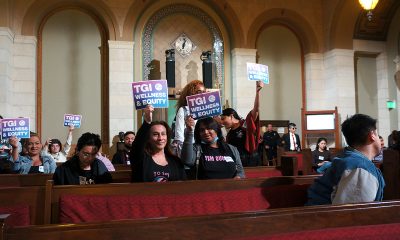Central America
Arrest made in murder of Honduran Trans activist
Thalía Rodríguez killed in front of Tegucigalpa home on Jan. 10
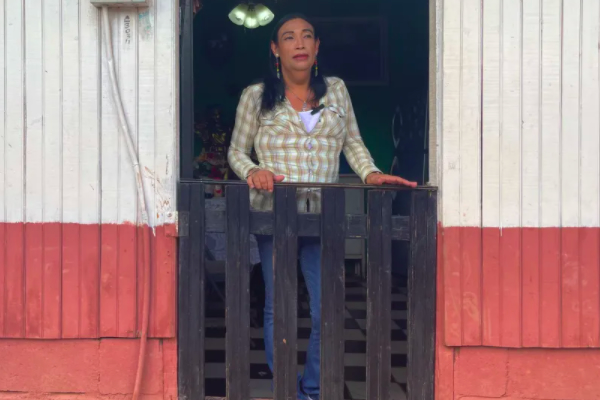
TEGUCIGALPA, Honduras — Authorities in Honduras have arrested a suspected gang member in connection with the murder of a Transgender activist.
Reportar sin Miedo, the Washington Blade’s media partner in Honduras, reported the Honduran National Police on Sunday announced agents with its Directorate of Investigations arrested a 28-year-old man for the Jan. 10 murder of Thalía Rodríguez in front of her home in Tegucigalpa, the Honduran capital.
Rodríguez, 58, led Asociación Cozumel Trans, a Honduran Trans rights group.
The Honduran National Police in their press release notes the man — known as “Karma” or “Fantasma” — is a member of MS-13.
Reportar sin Miedo reports a court last June issued a warrant for the man’s arrest on weapons charges.
Rodríguez’s murder, which took place 17 days before Vice President Kamala Harris and others attended Honduran President Xiomara Castro’s inauguration in Tegucigalpa, sparked outrage among activists in the Central American country. The U.S. Embassy in Honduras and U.S. Agency for International Development Administrator Samantha Power are among those who condemned Rodríguez’s death.
El Salvador
El Salvador: el costo del silencio oficial ante la violencia contra la comunidad LGBTQ+
Entidades estatales son los agresores principales
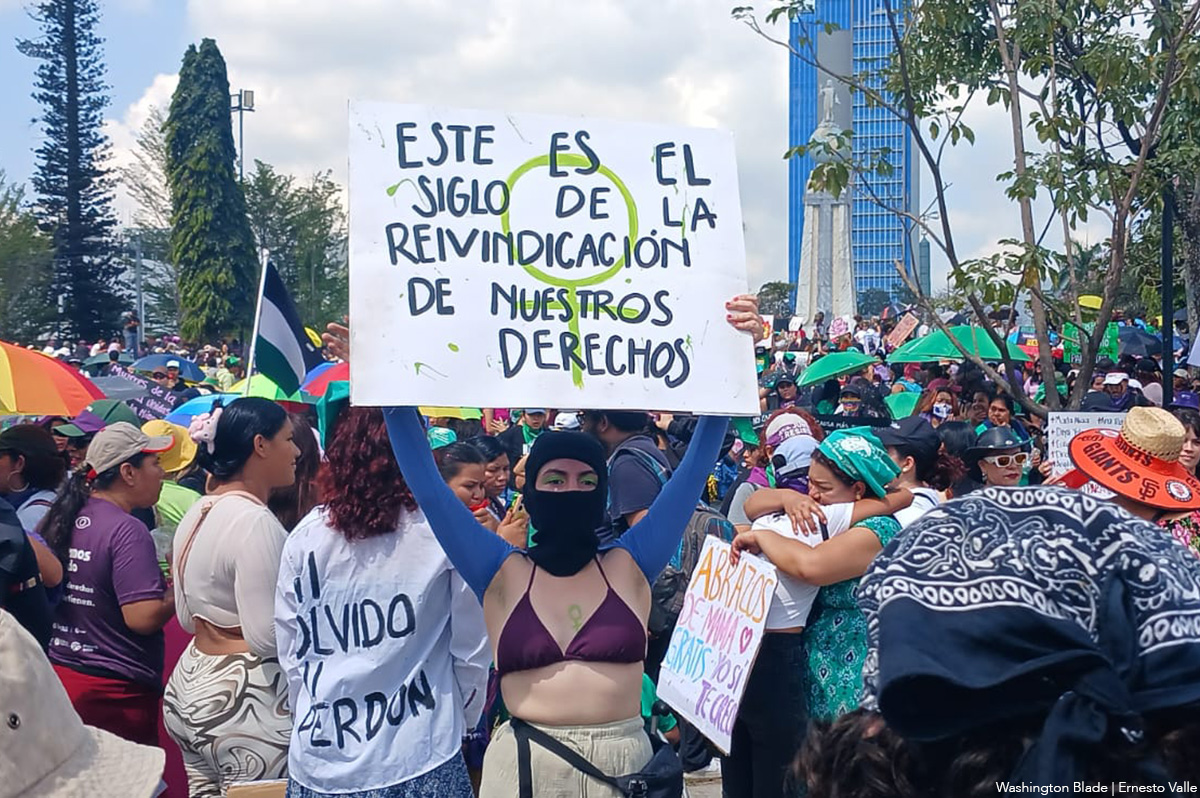
En El Salvador, la violencia contra la población LGBTQ+ no ha disminuido: ha mutado. Lo que antes se expresaba en crímenes de odio, hoy se manifiesta en discriminación institucional, abandono y silencio estatal. Mientras el discurso oficial evita cualquier referencia a inclusión o diversidad, las cifras muestran un panorama alarmante.
Según el Informe 2025 sobre las vulneraciones de los derechos humanos de las personas LGBTQ en El Salvador, elaborado por el Observatorio de Derechos Humanos LGBTIQ+ de ASPIDH, con el apoyo de Hivos y Arcus Foundation, desde el 1 de enero al 22 de septiembre de 2025 se registraron 301 denuncias de vulneraciones de derechos.
El departamento de San Salvador concentra 155 de esas denuncias, reflejando la magnitud del problema en la capital.
Violencia institucionalizada: el Estado como principal agresor
El informe revela que las formas más recurrentes de violencia son la discriminación (57 por ciento), seguida de intimidaciones y amenazas (13 por ciento), y agresiones físicas (10 por ciento). Pero el dato más inquietante está en quiénes ejercen esa violencia.
Los cuerpos uniformados, encargados de proteger a la población, son los principales perpetradores:
- 31.1 por ciento corresponde a la Policía Nacional Civil (PNC),
- 26.67 por ciento al Cuerpo de Agentes Municipales (CAM),
- 12.22 por ciento a militares desplegados en las calles bajo el régimen de excepción.
A ello se suma un 21.11 por ciento de agresiones cometidas por personal de salud pública, especialmente por enfermeras, lo que demuestra que la discriminación alcanza incluso los espacios que deberían garantizar la vida y la dignidad.
Loidi Guardado, representante de ASPIDH, comparte con el Los Angeles Blade un caso que retrata la cotidianidad de estas violencias:
“Una enfermera en la clínica VICITS de San Miguel, en la primera visita me reconoció que la persona era hijo de un promotor de salud y fue amable. Pero luego de realizarle un hisopado cambió su actitud a algo despectiva y discriminativa. Esto le sucedió a un hombre gay.”
Este tipo de episodios reflejan un deterioro en la atención pública, impulsado por una postura gubernamental que rechaza abiertamente cualquier enfoque de inclusión, y tacha la educación de género como una “ideología” a combatir.
El discurso del Ejecutivo, que se opone a toda iniciativa con perspectiva de diversidad, ha tenido consecuencias directas: el retroceso en derechos humanos, el cierre de espacios de denuncia, y una mayor vulnerabilidad para quienes pertenecen a comunidades diversas.
El miedo, la desconfianza y el exilio silencioso
El estudio también señala que el 53.49 por ciento de las víctimas son mujeres trans, seguidas por hombres gays (26.58 por ciento). Sin embargo, la mayoría de las agresiones no llega a conocimiento de las autoridades.
“En todos los ámbitos de la vida —salud, trabajo, esparcimiento— las personas LGBT nos vemos intimidadas, violentadas por parte de muchas personas. Sin embargo, las amenazas y el miedo a la revictimización nos lleva a que no denunciemos. De los casos registrados en el observatorio, el 95.35 por ciento no denunció ante las autoridades competentes”, explica Guardado.
La organización ASPIDH atribuye esta falta de denuncia a varios factores: miedo a represalias, desconfianza en las autoridades, falta de sensibilidad institucional, barreras económicas y sociales, estigma y discriminación.
Además, la ausencia de acompañamiento agrava la situación, producto del cierre de numerosas organizaciones defensoras por falta de fondos y por las nuevas normativas que las obligan a registrarse como “agentes extranjeros”.
Varias de estas organizaciones —antes vitales para el acompañamiento psicológico, legal y educativo— han migrado hacia Guatemala y Costa Rica ante la imposibilidad de operar en territorio salvadoreño.
Educación negada, derechos anulados
Mónica Linares, directora ejecutiva de ASPIDH, lamenta el deterioro de los programas educativos que antes ofrecían una oportunidad de superación para las personas trans:
“Hubo un programa del ACNUR que lamentablemente, con todo el cierre de fondos que hubo a partir de las declaraciones del presidente Trump y del presidente Bukele, pues muchas de estas instancias cerraron por el retiro de fondos del USAID.”
Ese programa —añade— beneficiaba a personas LGBTQ+ desde la educación primaria hasta el nivel universitario, abriendo puertas que hoy permanecen cerradas.
Actualmente, muchas personas trans apenas logran completar la primaria o el bachillerato, en un sistema educativo donde la discriminación y el acoso escolar siguen siendo frecuentes.
Organizaciones en resistencia
Las pocas organizaciones que aún operan en el país han optado por trabajar en silencio, procurando no llamar la atención del gobierno. “Buscan pasar desapercibidas”, señala Linares, “para evitar conflictos con autoridades que las ven como si no fueran sujetas de derechos”.
Desde el Centro de Intercambio y Solidaridad (CIS), su cofundadora Leslie Schuld coincide. “Hay muchas organizaciones de derechos humanos y periodistas que están en el exilio. Felicito a las organizaciones que mantienen la lucha, la concientización. Porque hay que ver estrategias, porque se está siendo silenciado, nadie puede hablar; hay capturas injustas, no hay derechos.”
Schuld agrega que el CIS continuará apoyando con un programa de becas para personas trans, con el fin de fomentar su educación y autonomía económica. Sin embargo, admite que las oportunidades laborales en el país son escasas, y la exclusión estructural continúa.
Matar sin balas: la anulación de la existencia
“En efecto, no hay datos registrados de asesinatos a mujeres trans o personas LGBTIQ+ en general, pero ahora, con la vulneración de derechos que existe en El Salvador, se está matando a esta población con la anulación de esta.”, reflexiona Linares.
Esa “anulación” a la que se refiere Linares resume el panorama actual: una violencia que no siempre deja cuerpos, pero sí vacíos. La negación institucional, la falta de políticas públicas, y la exclusión social convierten la vida cotidiana en un acto de resistencia para miles de salvadoreños LGBTQ+.
En un país donde el Ejecutivo ha transformado la narrativa de derechos en una supuesta “ideología”, la diversidad se ha convertido en una amenaza política, y los cuerpos diversos, en un campo de batalla. Mientras el gobierno exalta la “seguridad” como su mayor logro, la población LGBTQ+ vive una inseguridad constante, no solo física, sino también emocional y social.
El Salvador, dicen los activistas, no necesita más silencio. Necesita reconocer que la verdadera paz no se impone con fuerza de uniformados, sino con justicia, respeto y dignidad.
Honduras
EPU: Honduras en deuda en violencia, niñez y diversidad sexual
Más de 70 organizaciones presentaron informes
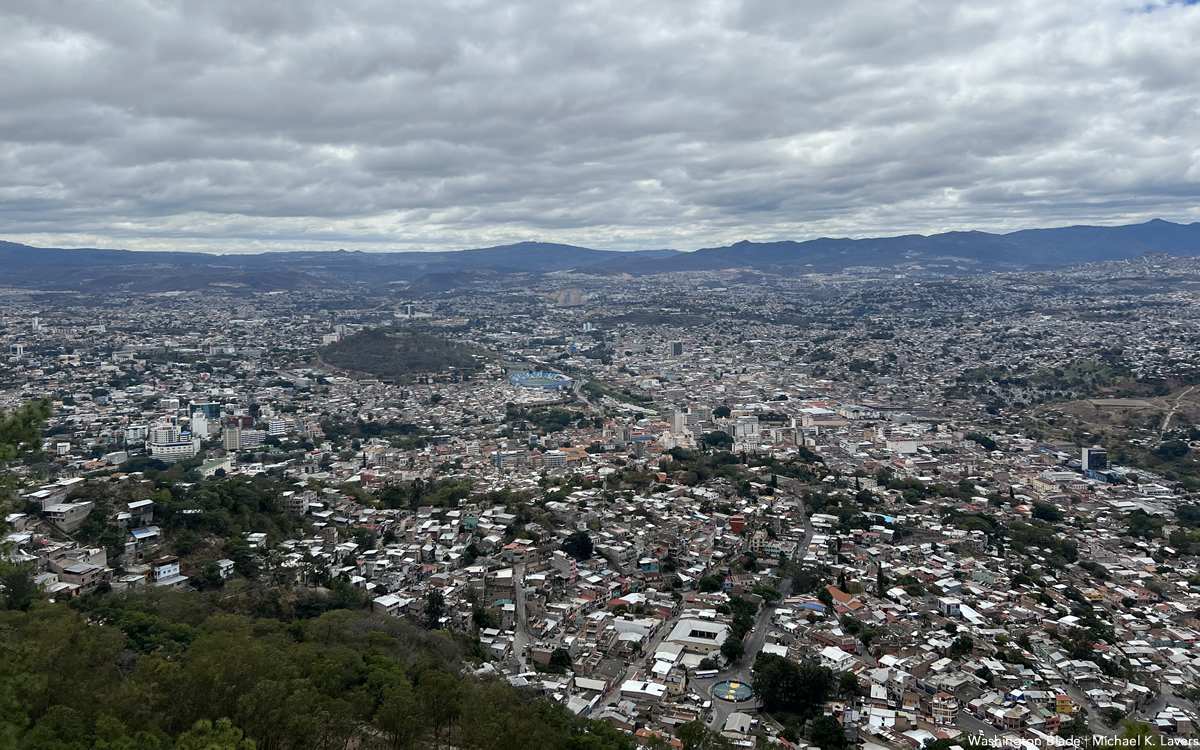
Por NAZARETH GÓMEZ | TEGUCIGALPA, Honduras — En el marco del Examen Periódico Universal (EPU), mecanismo del Consejo de Derechos Humanos de la ONU, organizaciones de sociedad civil en Honduras presentaron informes alternativos para evidenciar el incumplimiento de compromisos en materia de derechos humanos. Las recomendaciones al Estado serán revisadas en noviembre de 2025, cuando Honduras enfrente su evaluación internacional.
Durante el evento se compartieron siete informes temáticos sobre mujeres, niñez, diversidad sexual, personas defensoras, tierra, discapacidad y radios comunitarias. Las organizaciones exigen que las recomendaciones se traduzcan en acciones reales.
Violencia contra las mujeres y retrocesos legales
La Plataforma EPU Mujeres denunció que entre 2020 y 2024 se registraron más de 1,500 muertes violentas de mujeres y más de 8,600 evaluaciones médicas por violencia sexual. Solo hay tres juzgados especializados y 72 fiscales para más de 100 mil denuncias anuales.
También alertaron que no se ha aprobado la Ley Integral contra la Violencia hacia las Mujeres ni la Ley de Violencia Política. Ciudad Mujer opera solo en seis ciudades, dejando sin cobertura al 42.8 por ciento de las mujeres. “Seguimos exigiendo voluntad política para avanzar”, afirmaron.
Niñez: pobreza, violencia y abandono estatal
Organizaciones como Coiproden expusieron que el 66.8 por ciento de la niñez vive en pobreza y que siete de cada diez están en situación de pobreza multidimensional. Aunque se ha creado la Secretaría de Niñez y se aprobó una política nacional, aún no hay presupuesto suficiente ni liderazgo institucional claro.
Entre 2020 y 2024, más de 270 niñas, niños y adolescentes murieron por violencia. También se reportaron más de 800,000 alertas de desaparición, de las cuales el 30 por ciento corresponde a niñez. Las organizaciones exigen actualizar la política de prevención de violencia y fortalecer el sistema de protección.
Diversidad sexual: impunidad y exclusión
Desde 2009, más de 400 personas LGBTQ+ han sido asesinadas en Honduras, con un 93 por ciento de impunidad. Las organizaciones denunciaron la falta de avance en la aprobación de la Ley de Identidad de Género, el reconocimiento legal del matrimonio igualitario y la adopción de políticas inclusivas.
“El Estado mantiene patrones de discriminación institucional. No basta con crear políticas si no hay voluntad para implementarlas”, señalaron.
Solo existen seis fiscales a nivel nacional para investigar estos crímenes.
Territorio, pueblos indígenas y represión
El Centro de Estudios para la Democracia denunció que más de 1.8 millones de personas enfrentan inseguridad alimentaria grave. No se han hecho reformas para resolver la deuda agraria ni se han implementado sentencias a favor de comunidades garífunas.
También señalaron que, a pesar de existir un mecanismo de protección, Honduras sigue siendo uno de los países más peligrosos para las personas defensoras. “Se asesina, se criminaliza y no hay respuestas del Ministerio Público”, denunciaron.
Llamado urgente
Las organizaciones exigieron al Estado hondureño tomar con seriedad las recomendaciones del EPU.
Además, exigieron asumir compromisos reales con los sectores históricamente excluidos y garantizar el cumplimiento de los derechos humanos desde una visión integral y con enfoque de justicia.
Los informes completos están disponibles para consulta pública.
El Salvador
La marcha LGBTQ+ desafía el silencio en El Salvador
Se realizó el evento en San Salvador bajo la lluvia, pero con orgullo

SAN SALVADOR, El Salvador — El reloj marcaba el mediodía cuando los primeros colores del arcoíris comenzaron a ondear frente a la emblemática Plaza del Divino Salvador del Mundo. A pesar de la incertidumbre generada en redes sociales, donde abundaban los rumores sobre una posible cancelación de la marcha por la diversidad sexual, la ciudad capital comenzaba a llenarse de esperanza, de resistencia y de orgullo.
Este año, la Marcha del Orgullo LGBTQ+ en El Salvador se desarrolló en un contexto tenso, en medio de un clima político que reprime y silencia a las voces disidentes.
“Aunque las estadísticas digan que no existimos, viviendo en El Salvador, un país donde hoy, después de décadas de avances, defender los derechos humanos es de nuevo una causa perseguida, criminalizada y silenciada”, afirmaron representantes de la Federación Salvadoreña LGBTQ+.
A pesar de la cancelación del festival cultural que usualmente acompaña la marcha, los colectivos decidieron seguir adelante con la movilización, priorizando el sentido original de la actividad: salir a las calles para visibilizarse, exigir respeto a sus derechos y recordar a quienes ya no están.
A la 1:30 p.m., una fuerte lluvia comenzó a caer sobre la ciudad. Algunas de las personas presentes corrieron a refugiarse, mientras otras, debajo de sombrillas y de los escasos árboles en la plaza, decidieron mantenerse firmes. Los comentarios pesimistas no se hicieron esperar: “a lo mejor la cancelan por el clima”, “no se ve tanta gente como otros años”. Sin embargo, lo que siguió fue una muestra de resistencia: a las 2:05 p.m. las voces comenzaron a llamar a tomar las calles.
Visibilidad como resistencia
La marcha arrancó bajo una llovizna persistente. La Avenida Roosevelt y la Alameda Juan Pablo II se tiñeron de colores con banderas arcoíris, trans, lésbicas, bisexuales y otras que representan a los diversos sectores de la población LGBTQ+. Cada bandera alzada fue un acto político, cada paso una declaración de existencia.
Desde la Plaza del Divino Salvador del Mundo hasta la Plaza Gerardo Barrios, frente a Catedral Metropolitana y el Palacio Nacional, la marcha se convirtió en un carnaval de dignidad. Carteles con frases como “El amor no se reprime”, “Mi existencia no es delito” o “Marcho por quien ya no puede hacerlo” se alzaron entre las multitudes.
La movilización fue también un espacio para recordar a quienes han perdido la vida por la discriminación y el rechazo. Familias que marcharon por hijos, hijas o amigues que se suicidaron a causa del estigma. Personas que caminaron por quienes aún viven en el miedo, por quienes no pudieron salir del clóset, por quienes se han ido del país huyendo de la violencia.
Arte, fe y rebeldía
Una de las escenas más llamativas fue protagonizada por Nelson Valle, un joven gay que marchó vestido como sacerdote.
“Hay muchas personas que secretamente asisten a ritos religiosos como en Semana Santa, y les gusta vivir en lo oculto. Pero la fe debe ser algo libre porque Dios es amor y es para todos”, dijo.
Valle utilizó su vestimenta como una forma de protesta contra las estructuras religiosas que aún condenan la diversidad sexual.
“Un ejemplo de persona que abrió el diálogo del respeto fue el papa Francisco, abrió la mente y muy adelantado a su tiempo, porque dejó claro que hay que escuchar a toda persona que quiere encontrar a Dios”, agregó.
La marcha también incluyó bandas musicales, grupos de cachiporristas, carrozas artísticas, colectivos provenientes de distintos puntos del país, y manifestaciones de orgullo en todas sus formas. Fue un mosaico cultural que mostró la riqueza y diversidad de la población LGBTQ+ en El Salvador.

Una lucha que persiste
Las organizaciones presentes coincidieron en su mensaje: la lucha por la igualdad y el reconocimiento no se detiene, a pesar de los intentos del Estado por invisibilizarlos.
“Nuestros cuerpos se niegan a ser borrados y a morir en la invisibilidad de registros que no guardan nuestros nombres ni nuestros géneros”, declararon representantes de la Federación.
Además, agregaron: “Desde este país que nos quiere callar, levantamos nuestras voces: ¡La comunidad LGBTIQ+ no se borra! ¡El Salvador también es nuestro! Construyamos, entre todes, un país donde podamos vivir con Orgullo.”
El ambiente fue de respeto, pero también de desconfianza. La presencia de agentes policiales no pasó desapercibida. Aunque no hubo reportes oficiales de violencia, varias personas expresaron su temor por posibles represalias.
“Marchar hoy es también un acto de valentía”, comentó Alejandra, una joven lesbiana que viajó desde Santa Ana para participar. “Pero tenemos derecho a vivir, a amar, a soñar. Y si nos detenemos, les damos la razón a quienes nos quieren ver en silencio.”
Rumbo al futuro
Concluida la marcha frente a Catedral y el Palacio Nacional, muchas personas permanecieron en la plaza compartiendo abrazos, fotos y palabras de aliento. No hubo festival, no hubo escenario, pero hubo algo más valioso: una comunidad que sigue viva, que sigue resistiendo.
Los retos son muchos: falta de leyes de protección y que apoye las identidades de las personas trans, discriminación laboral, violencia por prejuicio, rechazo familiar, y una narrativa estatal que pretende que no existen. Pero la marcha del 28 de junio demostró que, aunque el camino sea cuesta arriba, la dignidad y el orgullo no se borran.
La lucha por un El Salvador más justo, más plural y más inclusivo continúa. En palabras de uno de los carteles más llamativos de ese día: “No estamos aquí para pedir permiso, estamos aquí para recordar que también somos parte de este país”.
El Salvador
El Salvador conmemora el 17M bajo un clima de miedo y retroceso en derechos LGBTQ+
Activistas denunciaron al gobierno de Nayib Bukele
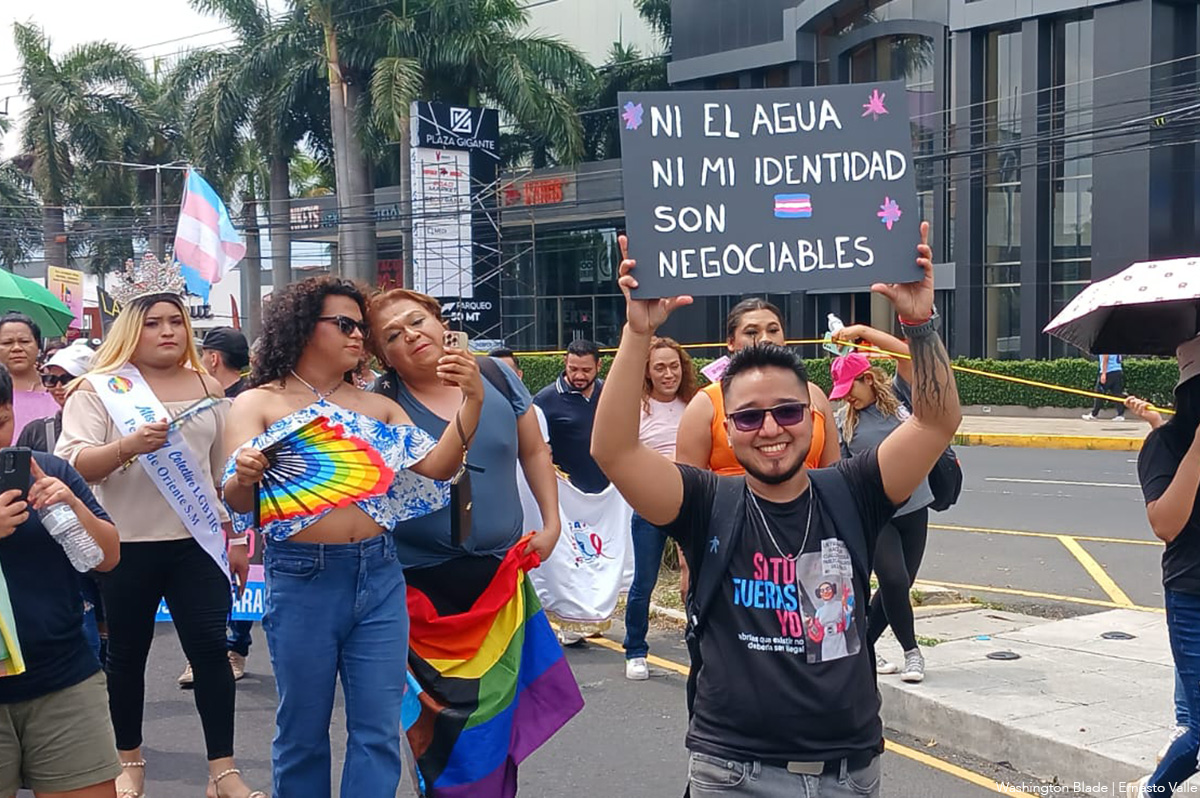
El 17 de mayo se conmemora a nivel mundial el Día Internacional contra la Homofobia, Transfobia y Bifobia, recordando la eliminación de la homosexualidad como enfermedad mental por parte de la Organización Mundial de la Salud en 1990. Sin embargo, esta fecha también se ha convertido en un espacio de denuncia ante la violencia estructural e institucional que sigue afectando a la población LGBTQ+ en muchos países, incluido El Salvador.
Este año, la marcha conmemorativa del 17 de mayo en San Salvador fue más reducida que en ocasiones anteriores. Decenas de personas se reunieron para alzar su voz a pesar del temor creciente entre quienes integran la diversidad sexual y de género.
Las amenazas no son nuevas, pero sí más frecuentes en el contexto actual.
Activistas, colectivas y organizaciones de derechos humanos denuncian que el gobierno de Nayib Bukele ha profundizado un discurso y una práctica anti-derechos. Para muchas de estas personas, la visibilidad se ha vuelto sinónimo de riesgo.
Desde la Asociación ASPIDH, Valeria Mejía, coordinadora de monitoreo y evaluación, expresó que “a inicios de 2025, el presidente Nayib Bukele y su gobierno oficializaron una postura anti-derechos, profundizando las amenazas estructurales contra los derechos humanos en El Salvador”. Alegan que esto ha generado retrocesos concretos para la comunidad LGBTQ+.
Mónica Hernández, directora ejecutiva de ASPIDH, ha sido enfática en sus declaraciones.
“Se está silenciando a las organizaciones defensoras de derechos humanos a través de amenazas o restricciones legales”, afirmó. Y exigió al gobierno restituir los mecanismos que protegían a la población diversa.
Una de las luchas históricas aún sin respuesta es la aprobación de una ley de identidad de género. Actualmente, las personas trans no pueden modificar su nombre y género en sus documentos legales, lo que las expone a tratos humillantes en hospitales, centros educativos, juzgados y otras instituciones públicas.
La falta de una legislación que apoye a las personas trans sobre su identidad de género sigue siendo una afectación, por lo que sufren discriminación institucionalizada, en hospitales, centros educativos, juzgados, entre otros, donde suelen enfrentar trato discriminatorio o negación de servicios por no coincidir su identidad de género con sus documentos legales, mencionó una vocera de la Mesa por Una Ley de Identidad.
En la marcha de este año, las calles no se llenaron como en otras ocasiones. El miedo a la criminalización fue evidente.
“Los agentes del CAM me dijeron que con este régimen me podían acusar de ser pandillera solo por ser trans y andar tatuada”, declaró una participante, temblorosa, al Los Angeles Blade.
A pesar del temor, hubo presencia. Algunas organizaciones de base y colectivos de clase trabajadora mostraron su solidaridad. Entre ellas, el Movimiento por la Defensa de los Derechos Humanos de la Clase Trabajadora, quienes acompañan el caso de Carolina Escobar, una mujer trans despedida injustamente del ISDEMU.
Escobar también estuvo en la marcha.
“Hay que permanecer unidas las minorías, yo estoy acá a pesar de que he sufrido persecución por parte de la Policía Nacional Civil, por dar seguimiento a los casos de despidos injustificados del ISDEMU”, comentó.
La analista política y activista Bessy Ríos de la organización De La Mano Contigo no se mostró optimista con el panorama.
“Hay que prepararse para el peor de los escenarios y crear redes de apoyo entre nosotros”, recalcó durante la jornada conmemorativa.
La colectiva feminista también acompañó la marcha y compartió con otros colectivos mensajes de unidad.
“En tiempos difíciles, es cuando debemos unirnos más”, dijo una joven activista con una pañoleta verde en su rostro.
La represión no solo se percibe en las calles. Desde hace meses, muchas organizaciones LGBTQ+ han denunciado bloqueos al financiamiento internacional que sostenía proyectos de apoyo, atención psicológica y asesoría legal. Sin esos fondos, la lucha se vuelve más cuesta arriba.
Además, la anunciada Ley de Agentes Extranjeros —todavía en discusión— amenaza con imponer un impuesto del 30 por ciento a las donaciones provenientes del extranjero. Esto pondría en jaque a decenas de ONG que trabajan directamente con poblaciones vulnerables, incluida la diversidad sexual.
La consigna en esta fecha ha sido clara: la lucha no se detiene. Incluso con menos recursos y bajo amenazas, quienes se organizaron para conmemorar el 17 de mayo lo hicieron con la firme convicción de que los derechos humanos no se negocian.
Desde las pancartas hasta las intervenciones públicas, el mensaje fue contundente: el Estado salvadoreño debe cesar toda forma de discriminación hacia las personas LGBTQ+ y garantizar políticas inclusivas que aseguren su acceso a la salud, la educación, la justicia y el empleo.
En cada paso, se entretejía el recuerdo de quienes ya no están, y el deseo ferviente de un futuro distinto.
“Marchamos por quienes no pudieron llegar hoy, por quienes tienen miedo, por quienes ya no están. Seguiremos exigiendo respeto y dignidad”, expresó una activista.
Honduras
Detienen a Romeo Vásquez por asesinato de Isy Obed: ¿cuándo pagará por Vicky Hernández?
Líder trans fue asesinada durante el golpe de estado de 2019
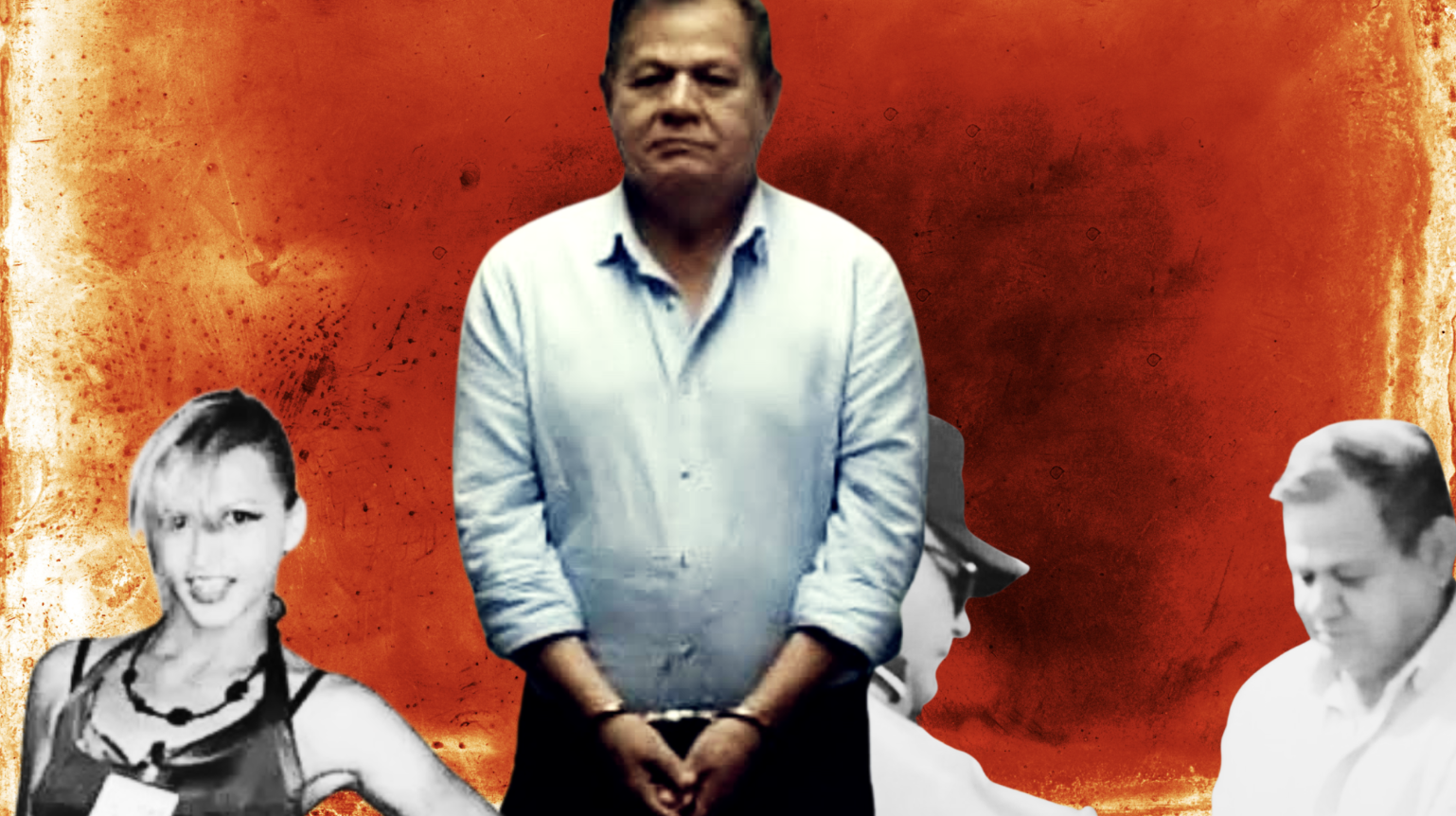
TEGUCIGALPA, Honduras — Casi 16 años después del asesinato de la líder trans Vicky Hernández, el general retirado Romeo Vásquez Velásquez fue capturado hoy como supuesto responsable de la muerte violenta de Isy Obed Murillo durante el golpe de Estado de 2009.
Tras el arresto, la opinión pública ha exigido justicia para Isy Murillo y la activista trans. Ambos fueron las primeras víctimas mortales del toque de queda encabezado por Vásquez Velásquez tras el golpe de Estado contra Manuel Zelaya Rosales en 2009.
La opinión pública se pregunta si de este modo se está allanando el camino para que los responsables paguen por el asesinato de Vicky Hernández e Isy Obed.
Junto con el general en retiro, las autoridades capturaron a otros jerarcas de las Fuerzas Armadas.
Estos arrestos, según el Ministerio Público, se deben a que estos militares comandaron y lideraron el operativo en que soldados abrieron fuego contra manifestantes opuestos al golpe de Estado, el 5 de julio de 2009.
Ese día, cientos de hondureños se aglomeraron cerca del aeropuerto Toncontín, en Tegucigalpa, para manifestarse y recibir al presidente Manuel Zelaya Rosales, quien iba a regresar en avión a Honduras.
Sin embargo, el ejército impidió la entrada de Zelaya en una acción en la cual mató de un balazo en la cabeza al joven Isy Obed Murillo.
«No solo incumplieron su deber de supervisar y controlar a sus subordinados, sino que, con pleno conocimiento de los hechos, permitieron y facilitaron estas atrocidades», dijo el MP en un comunicado.
A través de sus redes sociales, Romeo Vásquez respondió que la acusación en su contra es un intento del Gobierno de «callarlo a cualquier costo».
¿Pagará Romeo por el asesinato de Vicky?
Con la captura de Romeo Vásquez, el gobierno de Xiomara Castro parece haber dado un paso firme en busca de justicia para las víctimas del golpe de Estado de 2009.
Sin embargo, los arrestos de hoy han recibido también las críticas de grupos de la oposición y críticos de la administración de la presidenta Castro.
Por otro lado, la ciudadanía espera que no solo se haga justicia en el caso de Isy Obed Murillo, sino también en el de centenares de víctimas durante el mandato del general Romeo Vásquez bajo el gobierno de facto de Roberto Micheletti.
Por sobre todo, urge que las capturas de hoy abran la puerta para que las poblaciones LGBTQ+ victimizadas durante el golpe de Estado de hace 16 años reciban por fin una justicia largamente esperada.
Así, defensoras de los derechos de las diversidades esperan que las acciones de hoy sirvan para reivindicar a activistas como Vicky Hernández, asesinada entre el 28 y 29 de julio de 2009.
“¿Cuándo pagará Romeo Vásquez por el asesinato de Vicky Hernández?” es la pregunta que se hacen las organizaciones defensoras de derechos humanos de las poblaciones de la diversidad sexual en Honduras.
Según la sentencia de Vicky Hernández vs Honduras, la muerte de Vicky fue una ejecución extrajudicial cometida entre el 28 de junio y la madrugada del 29 de junio en San Pedro Sula, norte de Honduras.
El asesinato de la líder trans se dio en el marco del toque de queda y el golpe de Estado ejecutado por Roberto Micheletti contra Manuel “Mel” Zelaya a través del jefe de las Fuerzas Armadas, Romeo Vásquez Velásquez.
“Como representantes de las víctimas, exigimos justicia y no olvidar los asesinatos de personas LGBTI+ en el marco del golpe de Estado”, afirmó Indyra Mendoza de la Red Lésbica Cattrachas.
Asimismo, la Red Lésbica Cattrachas pidió al Ministerio Público que no olvide la sentencia de la Corte Interamericana de Derechos Humanos (Corte IDH) del caso “Vicky Hernández vs Honduras”, donde se especifica que el asesinato de la líder trans fue una ejecución extrajudicial.
En su sentencia, la Corte constató indicios de participación de agentes estatales en la violación del derecho a la vida de Vicky Hernández en un contexto de violencia anti-LGBTQ+.
El Estado reconoció en parte su responsabilidad internacional, ya que las autoridades no investigaron con diligencia el homicidio de Vicky. De hecho, según la Corte, las autoridades no consideraron el contexto de discriminación y violencia policial contra las personas LGBTQ+ y las mujeres trans trabajadoras sexuales.
Asimismo, el Tribunal determinó que, al haber sido asesinada y por el marco jurídico general de discriminación, se vulneraron los derechos a no discriminación y a la identidad de género de Vicky. A su vez, el Tribunal encontró que las familiares de Vicky Hernández resultaron afectadas por el sufrimiento que les causó su muerte, la permanente discriminación contra ella y la impunidad del homicidio.
En razón de estas violaciones, la Corte ordenó diversas medidas de reparación al Estado. Entre estas demandas está promover y continuar las investigaciones sobre el homicidio de Vicky Hernández.
Así reaccionan al arresto de Romeo
Minutos después de la captura del general retirado Romeo Vásquez para deducirle responsabilidades por la muerte violenta de Isy Obed Murillo, personalidades del ambiente político y social de Honduras salieron a dar declaraciones al respecto en medios y redes sociales.
El padre Ismael Moreno se halla entre quienes manifestaron su satisfacción por las capturas que hacen vislumbrar un rayo de esperanza a las familiares de las víctimas del golpe de 2009. En sus redes sociales, el padre Melo señaló que no es posible dejar “en el olvido” crímenes como el cometido contra Murillo.
“Que la justicia actúe con firmeza y conforme a debido proceso ante un militar que simboliza unas FF. AA. comprometidas con la impunidad. Ningún hecho de violación a derechos humanos y crímenes que vinculan al Estado contra inocentes prescriben ni pueden quedar en el olvido”, escribió Melo.
De manera parecida se expresó David Murillo, padre del joven asesinado en 2009. «No es persecución política, ¡él mató a mi hijo, él es el culpable!», afirmó el padre de Isy.
🚨 #ÚLTIMAHORA | 🗣️David Murillo: "No es persecución política, ¡él mató a mi hijo, él es el culpable!".
En #EXCLUSIVA, el padre de Isy Obed Murillo se pronuncia ante la captura de Romeo Vasquez Velázquez pic.twitter.com/Y1gX1j1iMP
— TSiHonduras (@TSiHonduras) January 5, 2025
Del mismo modo, el abogado Joaquín Mejía recomendó, por su parte, consultar el informe de la Comisión de la Verdad y la Reconciliación “que establece la responsabilidad de [Vásquez] en las graves violaciones a derechos humanos cometidas en el contexto del golpe de Estado”.
“Según la Comisión, la ‘responsabilidad del general […] está estrechamente ligada a la de Micheletti’”, publicó Mejía en sus redes. Además, afirmó que no debe olvidarse la responsabilidad del resto del Estado Mayor Conjunto.
Mientras tanto, la activista Berta Oliva ofreció un testimonio personal al recordar la manera como acompañó el dolor “de la madre y el padre de Isy Obed Murillo en su exilio en Argentina y en su romería interminable en Honduras”.
Para Oliva, la familia de Murillo ha recibido una “ofensa brutal” con “los años de silencio” alrededor del asesinato.
Entretanto, Gabriela Castellanos, del Consejo Hondureño Anticorrupción (CNA), volvió a mostrar por qué la consideran una de las críticas más duras del gobierno de Xiomara Castro.
“La persecución, la tortura y el asesinato de manera sistematizada de personas por motivos políticos en el marco del golpe de Estado en 2009, son hechos indiscutibles que hoy se disfrazan en nombre de la ‘justicia’”, aseguró Castellanos en X.
🗣️ Jorge Cálix: "Si se ha aplicado amnistía a otros como Rasel Tomé, el general puede solicitar ampararse en la misma ley". pic.twitter.com/JqjrIl36pw
— TSiHonduras (@TSiHonduras) January 5, 2025
Otro crítico de la acción de hoy del Ministerio Público, el analista político Olban Valladares, afirmó que la captura de Romeo Vásquez significa que el Ministerio Público “está cumpliendo instrucciones políticas de los que el pueblo ha identificado como los mandamases”.
Según Valladares, no es posible requerir a Vásquez porque “no se le ha probado ser ni el hechor material ni el intelectual” de la muerte violenta de Isy Murillo. Además criticó que Romeo “forma parte de un Estado Mayor Conjunto, una junta de comandantes, y se enfilan los cañones contra una sola persona”.
Entretanto, para el precandidato del Partido Liberal, Salvador Nasralla, medidas como el arresto del exjerarca militar Romeo Vásquez “sirven para asustar a la oposición”.
“En el caso de Romeo, lo que tienen que presentar son las pruebas por los que ellos creen que cometió”, agregó el presentador de televisión.
Declaraciones del Candidato Presidencial del Partido Liberal Salvador Nasralla sobre la persecución política que ha iniciado hoy 5 de enero 2025 el gobierno dictatorial de honduras. pic.twitter.com/sPKp49eXx0
— Salvador Nasralla (@SalvaPresidente) January 5, 2025
A las voces de la oposición que se alzaron contra la decisión del MP se unió el Partido Liberal, el cual declaró que está preocupado por la detención de Vásquez, “curiosamente avalada por funcionarios del Gobierno”.
Además, demandó al Ministerio Público que respete los derechos de Vásquez y pidió “no permitir por ningún motivo que se instale en nuestro país una nueva Venezuela”.
El Partido Nacional, por su parte, exigió «justicia plena, imparcial» y no usar las instituciones para vengarse.
La esposa de Romeo Vásquez, Lisbeth Zelaya, declaró que hace días habían amenazado a su esposo con encarcelarlo y que lo capturaron “sin pruebas”.
Para finalizar, las Fuerzas Armadas de Honduras se manifestaron la noche de hoy por medio de un comunicado sobre “la captura de tres exmiembros de esta institución”.
A continuación, la institución armada afirmó en el boletín que condena “todo golpe de Estado” y que rechaza “cualquier acción que implique la violación de los derechos humanos y las garantías constitucionales”.
Asimismo, las FF. AA. garantizó “que no habrá más golpes de Estado” y que “por ningún motivo las armas confiadas a nuestra institución serán utilizadas para afectar a nuestro pueblo”.
Central America
US Embassy in Panama condemns brutal attack of Trans woman
Estrella remains in coma at Panama City hospital

PANAMA CITY — The American, Canadian, Dutch, German and British embassies in Panama have condemned the brutal attack of a Transgender woman that has left her in a coma.
Panamanian media reports indicate Estrella, 27, suffered brain damage and lost 90 percent of her teeth when a man attacked her in Panama City on Aug. 16.
La Prensa, a Panamanian newspaper, on Aug. 18 reported Estrella remains in intensive care at a Panama City hospital and noted her lungs and kidneys are “not functioning.” The newspaper further noted the man who police have charged with the attack had his initial court appearance on Aug. 17.
Estrella’s mother, Aura Pinzón, told Panamá América, another Panamanian newspaper, her daughter moved to Panama City from David, a city in western Panama that is the capital of the country’s Chiriquí province, three months ago. Pinzón said doctors have told her they don’t expect Estrella to survive.
“We express our profound pain and our solidarity with Estrella, her loved ones and the trans community,” said the embassies in a statement they released on Tuesday. “Trans rights are human rights and all of them should all be protected, without exception. The love and sympathy that many Panamanians have showed for Estrella and their determination to put an end to hate and violence encourages us.”
The Office of the U.N. High Commissioner for Human Rights has also condemned the attack.
Panama does not ban discrimination based on gender identity. The State Department’s 2022 human rights report notes “societal discrimination based on sexual orientation and gender identity, which often led to denial of employment opportunities.”
“Civil society groups alleged continued police harassment of LGBTQI+ individuals as well as high levels of violence against Transgender persons,” notes the report. “Transgender activists alleged that a small number of police extorted transgender sex workers.”
Jessica Stern, the special U.S. envoy for the promotion of LGBTQ+ and intersex rights abroad, last September visited Panama.
First lady Jill Biden in May 2022 visited a Panama City shelter for people with HIV/AIDS. She announced the U.S. will provide an additional $80.9 million to fight the pandemic in Latin America.
Pope Francis visited the same shelter in 2019.
Central America
Panama urged to extend marriage rights to same-sex couples
Country’s Supreme Court earlier this year ruled against marriage equality
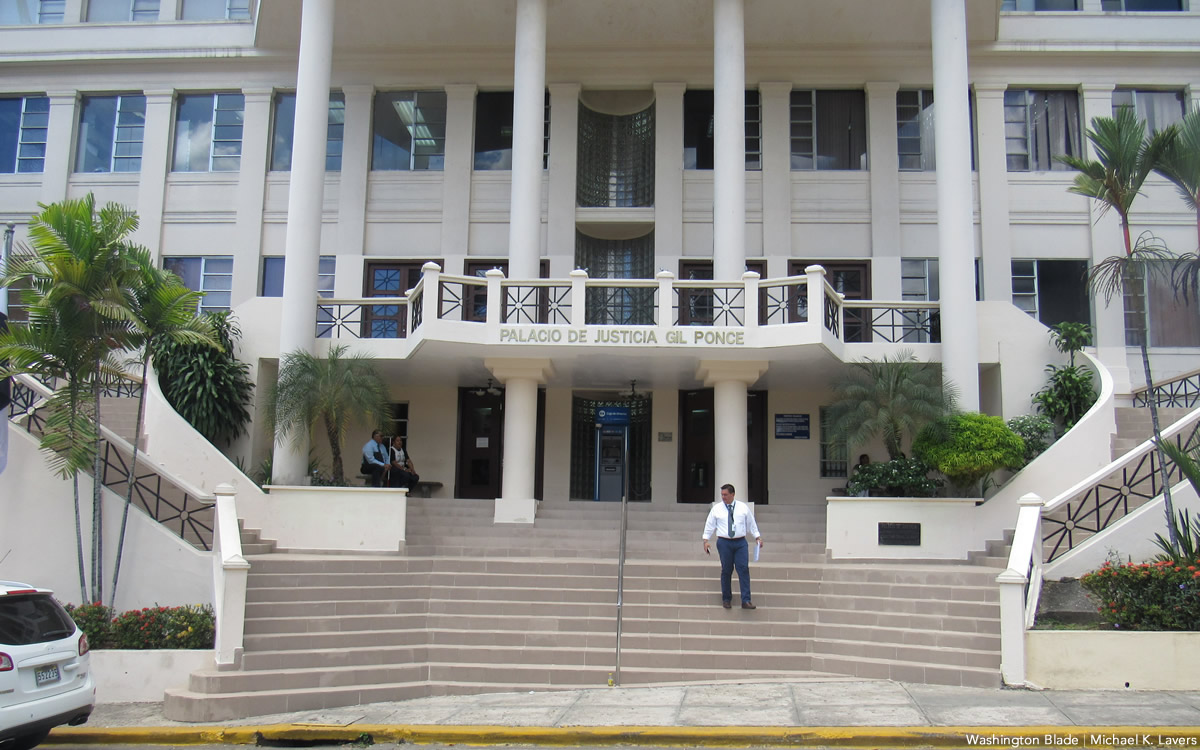
PANAMA CITY — The Inter-American Commission on Human Rights has urged Panama to extend marriage rights to same-sex couples.
The Panamanian Supreme Court in a March 1 press release noted six judges in February upheld the country’s prohibition of marriage for same-sex couples. The commission in a March 24 press release said the decision “has a negative impact on the principles of equality and non-discrimination by excluding the possibility of same-sex marriages and the recognition of those celebrated abroad.”
Enrique Jelenszky, a Panamanian citizen who married his husband, John Winstanley, in the U.K., in 2016 filed a lawsuit that sought recognition of their marriage. Álvaro Levy and his husband, Ken Gilberg, who is from the U.S., brought a second marriage equality lawsuit the same year.
Supreme Court Justice Luis Ramón Fábrega in 2017 heard arguments in the two cases that have been combined into one. Human Rights Watch notes three additional same-sex couples have brought marriage equality cases in Panama.
Neighboring Costa Rica and Colombia are among the jurisdictions in Latin America that have extended marriage rights to same-sex couples.
The Inter-American Court of Human Rights in 2018 published a landmark ruling that recognizes same-sex marriage and Transgender rights in the Western Hemisphere. Then-Panamanian Vice President Isabel de Saint Malo said her government would comply with the decision.
Former first lady Lorena Castillo is among those who have publicly backed marriage equality. Prominent religious leaders and officials in the current government remain vehemently opposed.
Iván Chanis Barahona, president of Fundación Iguales, a Panamanian advocacy group, this week told the Washington Blade the commission’s statement “was a very straightforward, categoric and clear reminder that Panama, as a member of the American Convention of Human Rights and as a member of the Inter-American Court of Human Rights, is obliged to secure marriage as the OC2417 (ruling) clearly established.”
“It is disappointing that Panama is not on that track, but it urged Panama to correct and amend this recent decision of the Supreme Court through all possible means, respecting our democratic values,” said Chanis.
“For me and for the work of Fundación Iguales and the work of civil society in Panama it’s very special support from our regional system of human rights to let us know that we are not alone and that we are on the right path of making Panama accountable as a sovereign state, part of the international community, to fulfill their human rights commitments,” he added. “This is a clear precedent that if Panama does not secure marriage and protections of LGBT people and couples in the coming year or years, Panama will lose at the Inter-American Court of Human Rights because the mandate is clear.”
Central America
Panamanian Supreme Court rules against marriage equality
Inter-American Court of Human Rights ruling applies to Central American country

PANAMA CITY — The Panamanian Supreme Court has upheld the country’s prohibition of marriage for same-sex couples.
A press release the Supreme Court issued on Wednesday notes six judges on Feb. 16 ruled the phrase “between a man and a woman” in Article 26 of Panama’s family code is not unconstitutional. The ruling also upholds a provision of a 2015 law that states “marriage between individuals of the same sex is prohibited.”
The press release notes the court concluded “the norms that provide that marriage should be voluntarily arranged between a man and a woman (who) are legally able to join to make and share a life together, and those that concomitantly prohibit people of the same sex from each other (Article 34, Number 1 of the family code and Article 35 of the Pan-American Code of Private International Law) are objectively and reasonably justified in the general interest of giving precedence to those unions with the potential of establishing families, giving continuity to the human race and, therefore, to society.”
“The ruling indicates that there is a reality, and that is, until now, the right to marriage equality is no more than an aspiration that, although legitimate for the groups involved, does not fall into a the category of a human right or a fundamental right, being that it lacks conventional and constitutional recognition,” notes the press release.
The court has yet to release the ruling itself.
Enrique Jelenszky, a Panamanian citizen who married his husband, John Winstanley, in the U.K., in 2016 filed a lawsuit that sought recognition of their marriage. Álvaro Levy and his husband, Ken Gilberg, who is from the U.S., brought a second marriage equality lawsuit the same year.
Supreme Court Justice Luis Ramón Fábrega in 2017 heard arguments in the two cases that have been combined into one. Human Rights Watch notes three additional same-sex couples have brought marriage equality cases in Panama.
Neighboring Costa Rica and Colombia are among the jurisdictions in Latin America that have extended marriage rights to same-sex couples.
The Inter-American Court of Human Rights in 2018 published a landmark ruling that recognizes same-sex marriage and transgender rights in the Western Hemisphere. Then-Panamanian Vice President Isabel de Saint Malo said her government would comply with the decision.
Former first lady Lorena Castillo is among those who have publicly backed marriage equality. Prominent religious leaders and officials in the current government remain vehemently opposed.
“This is clearly a ruling that has the intention to not only deny our human rights, but it is an activist-type of ruling if you think about it,” Iván Chanis Barahona, president of Fundación Iguales, a Panamanian advocacy group, told the Washington Blade on Wednesday during a WhatsApp interview.
Chanis said it is too soon to discuss a potential post-ruling strategy, but he did note Panama continues to violate the Inter-American Court of Human Rights ruling because same-sex couples cannot legally marry in the country.
“Technically Panama violated international law, violated international human rights law, violated the Inter-American system ruling,” said Chanis.
Central America
Trans woman deported from U.S. murdered in Honduras
Melissa Núñez had lived in Miami
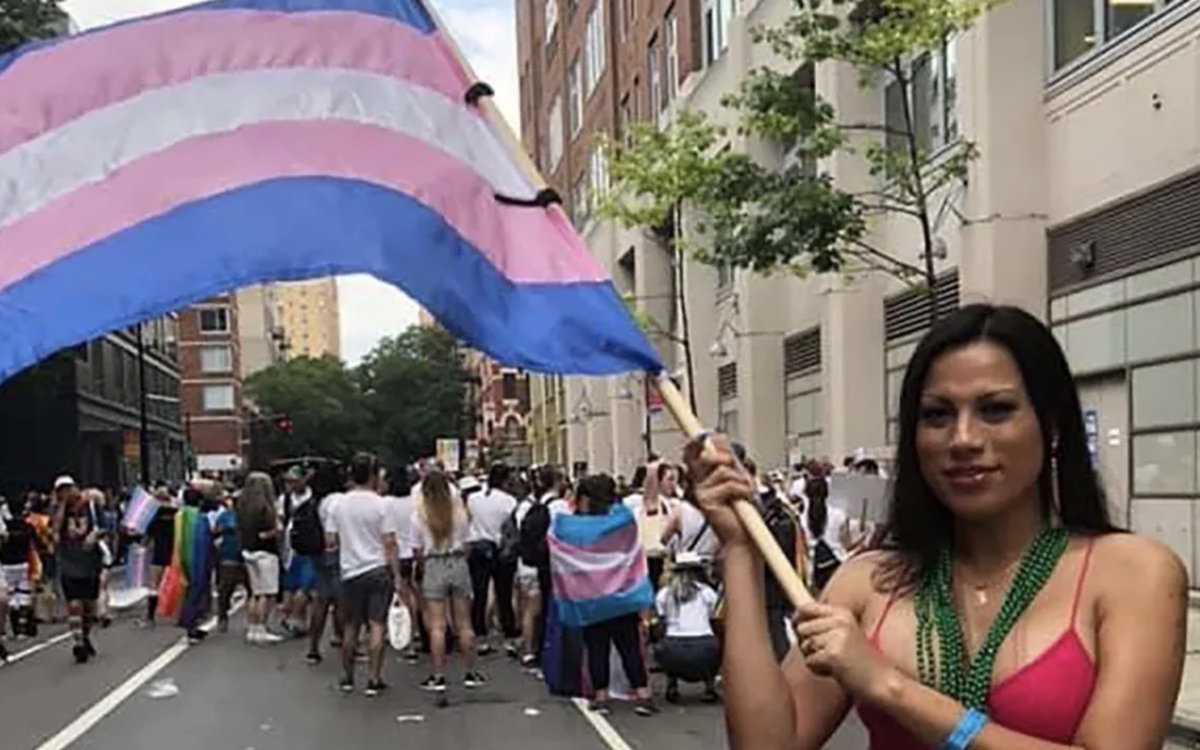
MOROCELÍ, Honduras — A Transgender woman who the U.S. deported to Honduras earlier this year has been murdered.
Reportar sin Miedo, the Washington Blade’s media partner in Honduras, reported a group of “hooded subjects” shot Melissa Núñez in Morocelí, a municipality in El Paraíso department in eastern Honduras, on Tuesday night.
Initial reports indicate Núñez, 42, died from a gunshot wound to the head.
Indyra Mendoza, general coordinator of Cattrachas, a lesbian feminist network based in the Honduran capital of Tegucigalpa, on Thursday confirmed to the Blade that Núñez asked for asylum in the U.S.
Mendoza said she did not know on what grounds Núñez asked for asylum, but Reportar sin Miedo reported she had lived in Miami and had more than 20,000 followers on TikTok. Núñez, according to Reportar sin Miedo, became “a strong activist” for LGBTQ+ and intersex rights while in the U.S.
Mendoza told the Blade that Núñez in December 2021 returned to Honduras after she traveled through Mexico and Guatemala. Núñez tried to return to the U.S., but Mendoza said American authorities deported her back to Honduras in July.
The Inter-American Court of Human Rights last June issued a landmark ruling that found Honduras responsible for the murder of Vicky Hernández, a Trans sex worker with HIV who died in police custody hours after the 2009 coup that ousted then-President Manuel Zelaya from power.
Zelaya’s wife, President Xiomara Castro, is among the Honduran officials who participated in a ceremony earlier this year during which the government publicly acknowledged it was responsible for Hernández’s murder. The admission the government reached with her family.
Violence and discrimination based on gender identity and expression nevertheless remains commonplace in Honduras. Vice President Kamala Harris is among the U.S. officials who have acknowledged anti-LGBTQ+ and anti-intersex violence are among the factors that prompt Hondurans and people from neighboring El Salvador and Honduras to leave their countries.
Camila Díaz Córdova, a Trans woman from El Salvador who the U.S. deported, was killed in San Salvador, the Salvadoran capital, in January 2019. A Salvadoran court convicted three police officers of Díaz’s murder and sentenced them to 20 years in prison.
Central America
Honduras government admits responsibility for Trans woman’s murder
Vicky Hernández killed in San Pedro Sula shortly after 2009 coup

SAN PEDRO SULA, Honduras — The government of Honduras on Monday publicly acknowledged it is responsible for the 2009 murder of a Transgender activist.
Vicky Hernández was a Trans activist and sex worker with HIV who worked with Colectivo Unidad Color Rosa, an advocacy group that is based in San Pedro Sula, the country’s second largest city.
Hernández’s body was found in a San Pedro Sula street on June 29, 2009, hours after the coup that ousted then-President Manuel Zelaya from power. Hernández and two other Trans women the night before ran away from police officers who tried to arrest them because they were violating a curfew.
The Inter-American Court of Human Rights last June issued a landmark ruling that found Honduras responsible for Hernández’s murder. The admission was part of the settlement.
Solicitor General Manuel Antonio Díaz Galeas and Foreign Minister Eduardo Enrique Reina García were among those who attended Monday’s ceremony that took place in front of Colectivo Unidad Color Rosa’s offices. President Xiomara Castro, who took office in January, participated virtually.
Kerry Kennedy, president of Robert F. Kennedy Human Rights, which represented Hernández’s family alongside Cattrachas, a lesbian feminist human rights group that is based in the Honduran capital of Tegucigalpa, also attended alongside Hernández’s mother, Rosa Hernández.
“We should love our children for who they are because they come from the womb,” said Rosa Hernández. “No one has a right to take a life.”
Kennedy noted the Honduran government “has taken the first steps by publicly acknowledging and taking responsibility and apologizing for murdering Vicky.”
Dona Rosa, you are such a beautiful soul. Thank you for trusting us with the fight for justice for your daughter. #JusticiaParaVicky pic.twitter.com/P44ANwbtNV
— Kerry Kennedy (@KerryKennedyRFK) May 9, 2022
Violence and discrimination based on gender identity and sexual orientation remains pervasive in Honduras.
Thalía Rodríguez, a prominent Trans activist, was killed outside her Tegucigalpa home on Jan. 11. Cattrachas notes she and Hernández are two of the more than 400 LGBTQ+ people who have been killed in the Central American country since 2009.
The Inter-American Court of Human Rights ordered Honduras to pay reparations to Hernández’s family and enact laws that protect LGBTQ+ people from violence and discrimination. Kennedy in her statement noted Castro has pledged “to making these necessary reforms.”
-

 Arts & Entertainment3 days ago
Arts & Entertainment3 days ago2026 Best of LGBTQ LA Finalist Voting
-

 Health4 days ago
Health4 days agoWhere medicine meets dignity: Be Well Medical Group founder Isaac Berlin is here and queer to serve the community
-

 Out & About4 days ago
Out & About4 days agoQueer, trans AAPI joy shone at this year’s Golden Dragon Parade
-

 Mexico5 days ago
Mexico5 days agoUS Embassy in Mexico issues shelter in place order for Puerto Vallarta
-

 Commentary3 days ago
Commentary3 days agoWhen optics matter more than harm: BAFTA, BBC, and editing solidarity while letting slurs slide on through
-

 California3 days ago
California3 days agoExperts discuss pathways forward as anti-trans violence continues to rise
-

 Autos4 days ago
Autos4 days agoGoing for gold: Ford Bronco Sport vs. Toyota RAV4
-

 a&e features3 days ago
a&e features3 days agoRevry Co-Founder Damian Pelliccione on why we need ‘King of Drag’
-

 Books3 days ago
Books3 days agoNew book profiles LGBTQ+ Ukrainians, documents war experiences
-

 Books2 days ago
Books2 days agoThe social side of self-pleasure: Artist Jason Wimberly presents his newest book of photography, HOMOSOCIAL

